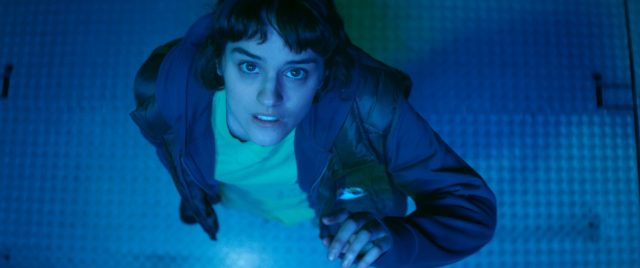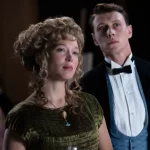AFI Fest 2020: Jumbo, by Scott Nye

You can almost picture Tony Shalhoub in full Barton Fink mode describing this movie to you – “French girl falls in love with a carnival ride. What do you need, a roadmap?” Indeed, for the price of admission (or whatever we’re calling on-demand streaming), you too can witness the unexpected spectacle of Portrait of a Lady on Fire’s own Noémie Merlant falling madly in love with one of those rides that spins you around while it’s tilting up and down. I’m sure there’s a name for them. Jeanne (Merlant) calls hers Jumbo. And she loves it. And it…maybe loves her?
The film plays the usual is-this-all-in-her-head game with how serious it wants to be about the more fantastical end of thing, which is a bit of a disappointment (we all kind of want to see Jumbo take out her scummy boss with a well-timed swoop at the climax, don’t we?), as is…really most of the other elements of this film, which involve the aforementioned scummy boss (Bastien Bouillon) trying to seduce her and a mother (Emmanuelle Bercot) who just wants her to find a nice boy and settle down, but whose own love life is a bit of a mess. The film also has a habit, common to sort of mainstream-adjacent French comedies, of drawing its humor from characters just randomly saying unexpected and inappropriate things, which gets a little dull fast.
That said, when the picture gets down to brass tacks, and lets Merlant loose on that ride, the film really comes alive. Merlant is completely in on the concept, and isn’t afraid to look ridiculous or foolish in the pursuit of expressing her true desire and love for this machine, desperately groping at it, her eyes lighting up as it more literally does. Writer/director Zoé Wittock, making her feature debut here, seems to come alive as well, changing up the film’s visual scheme into something more impressionistic and visually dazzling, as the ride’s thousands of light bulbs come to communicate its deepest feelings for Jeanne. The inevitable consummation between the two is far from the absurd spectacle it could be – not that Merlant couldn’t have played it – but is instead a totally surreal journey akin to Under the Skin’s forays into nothingness.
The more it focuses on Jeanne and lets Merlant lead the way, the better off the picture is, but unfortunately all this sort of peaks in the middle towards the second act break, with the ending sort of hobbling along to a people-sure-are-unique ending that ends up squandering the beauty of its premise and all it had drawn out of it to that point, at just the place in the film when it could have really expanded itself and become something grand. The film felt torn between these two ends all along, and it’s disappointing that it settled for the mundane.





























